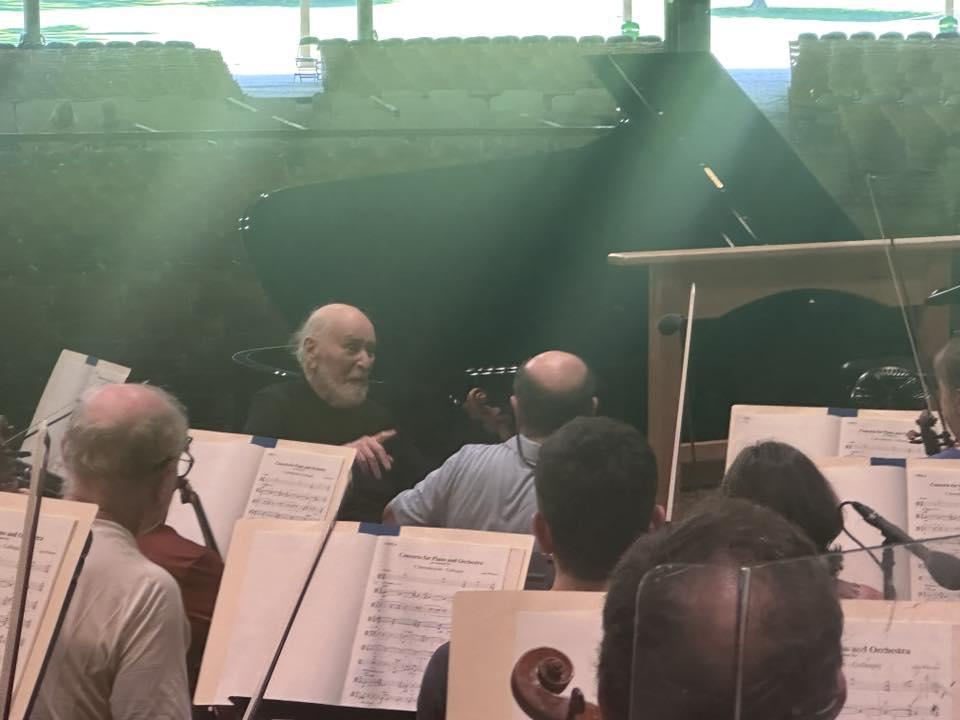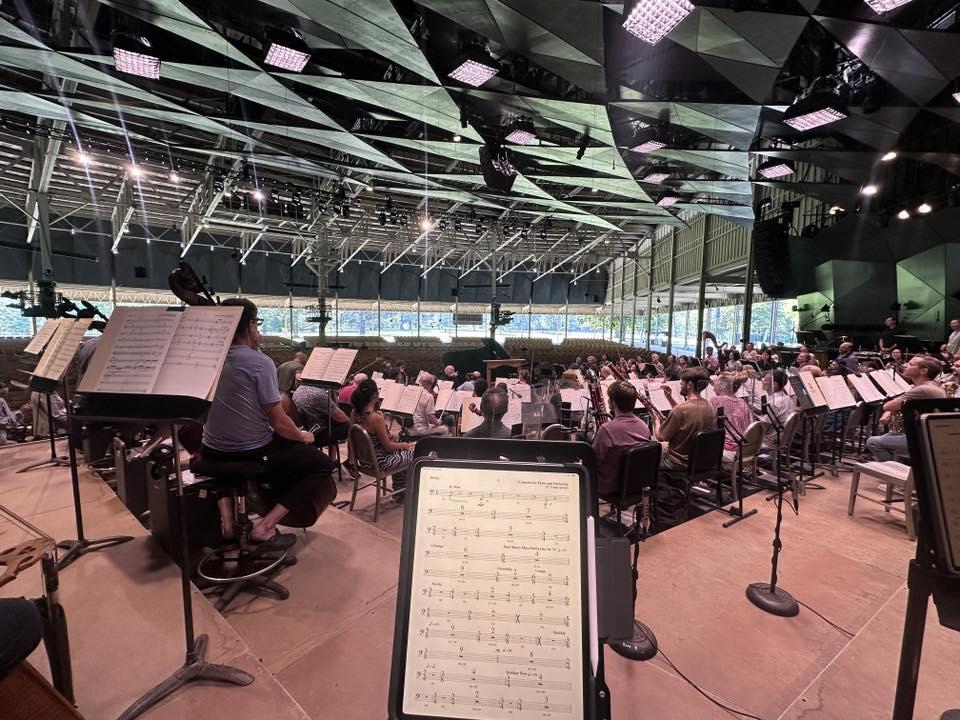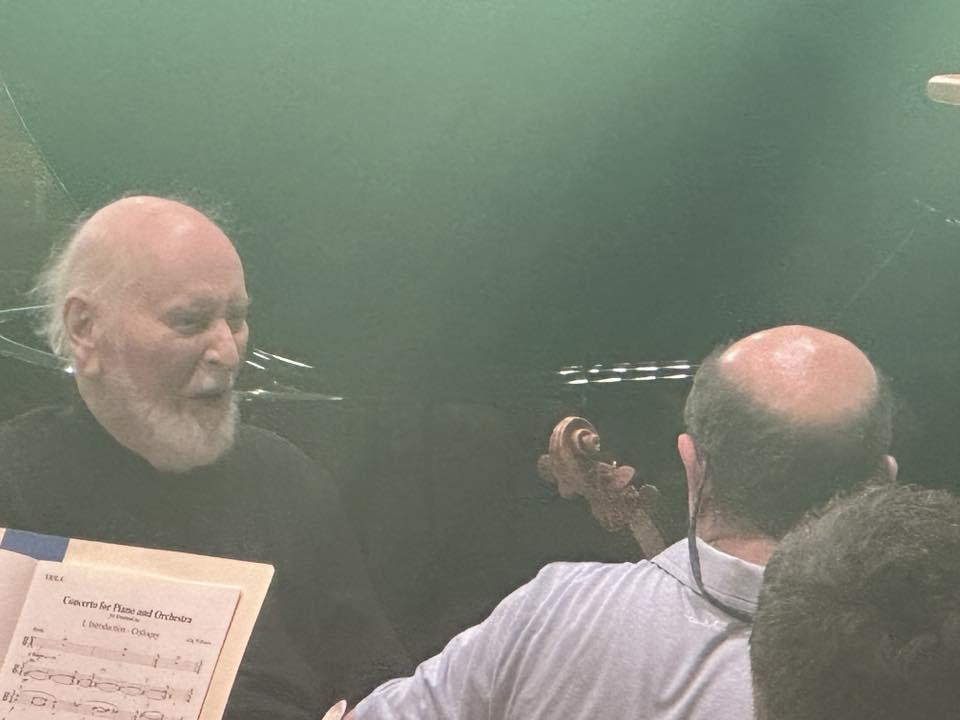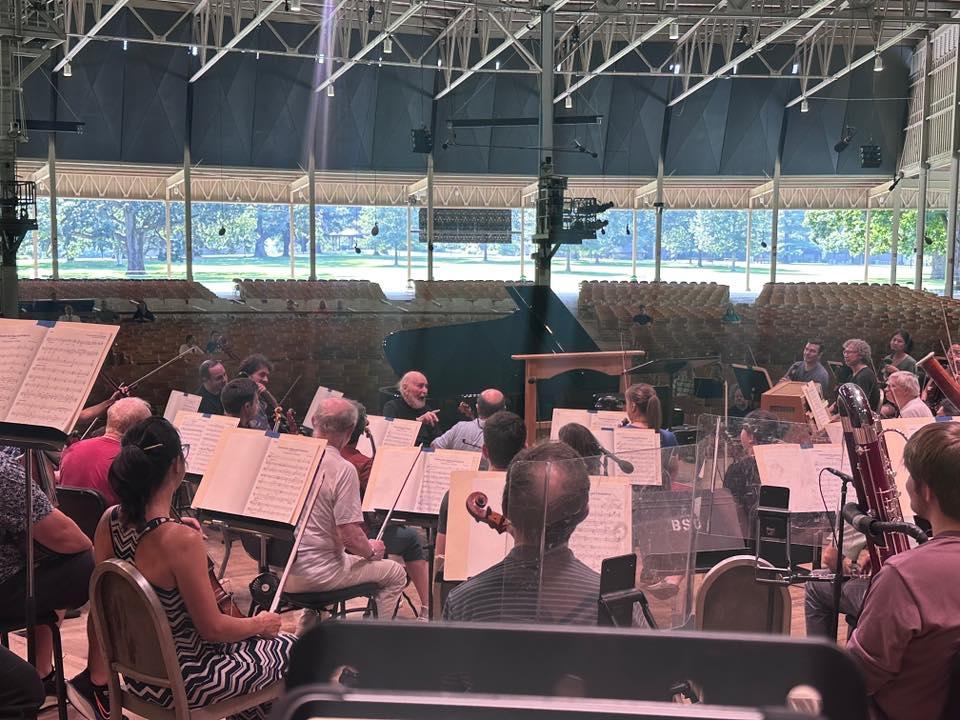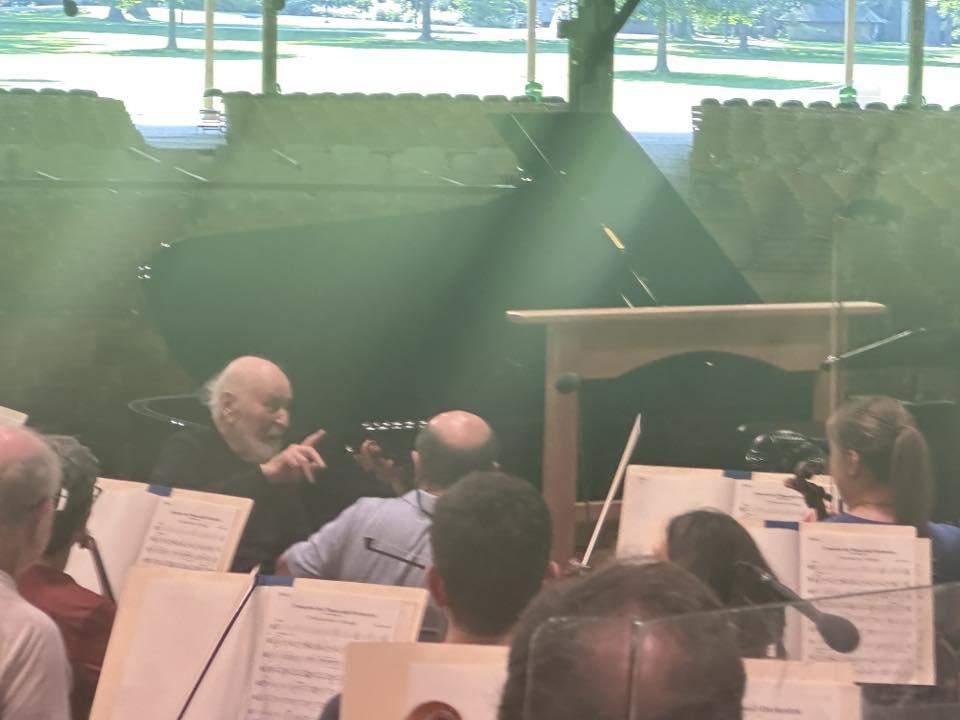‘JOHN WILLIAMS’ PIANO CONCERTO (WORLD PREMIERE)’
July 26, 2025, Koussevitzky Music Shed, Lenox, MA
Boston Symphony Orchestra conducted by Andris Nelsons.
Emanuel Ax, Piano
JOHN WILLIAMS, Special Guest
CONCERT PROGRAM
- Concerto for Piano and Orchestra (John Williams) – World Premiere
- Symphony No. 1 (Gustav Mahler)
REVIEWS
EXTERNAL REVIEWS
- The Boston Musical Intelligencer – The gripping first movement, labelled “introduction – Colloquy (Art Tatum)” revealed his ingenious and loving solution of commemorating the great jazz pianist Art Tatum, whom a teenaged Williams had heard play live in L.A.. Extracting Tatum’s “sound” from its jazzy context, Williams gave it a transfigured new life. After three introductory chords (a gesture that Williams remembered from Tatum), Ax produced impossibly sparkling high notes like drops of a quenching rain, which suddenly blurred just as impossibly into sheets of sound, prompting the orchestra to respond with a contrasting low brooding sound, somber and marvelously cavernous, as though turning a vast expanse of darkness into a protected place of ritual initiation – a rock shelter in the wilderness, a jazz club, a Shed. Strings then entered to create tension with a tinge of Stravinsky-esque barbaric urgency, horns and harp colluding to reinforce a feeling of angst while Ax’s luminous piano took on the joyous freedom of chimes, unbowed and unrepentant in its irrepressible vitality. – Full review
- Reddit – This concerto might be my favorite of his concertos that I’ve heard. I am biased, being an amateur pianist myself. My favorite movement was 2, which started with a solo viola cadenza, followed by a piano-viola duet, before bringing in the rest of the orchestra. It was the most lyrical of the movements. The other two movements are much more angular, percussive, and dissonant, but not completely untethered from melody and recognizable harmony. The 3rd movement was shorter and ended with a bang. Better musicians and writers than I will be able to offer a better musical review in the days ahead I’m sure. It’s a very difficult piece, of course. – Full review
- Sequenza21 – For this three-movement work, Williams drew his inspiration from jazz greats Art Tatum, Bill Evans, and Oscar Peterson. From the very start in the “Introduction – Colloquy (Art Tatum)”, the composition launched into bold jazz chords from the soloist. The rhythms went beyond ragtime, instantly recalling Tatum’s trademark stride piano style. The textures, timbres and sonorities of the jazz-infused score were as vividly colorful as Williams’ film scores – Full review
- Adventures in Music – From Tanglewood, the Piano Concerto travels first to Boston, where it will be recorded for Deutsche Grammophon in conjunction with four concert performances in January, followed by further outings in New York in February and Berlin in April. Having given a flying start on Saturday, the concerto is set on an inspired trajectory. – Full review
- The Legacy of John Williams – These passages are not only challenging to the performer—they are also the most challenging for the average listener, especially the average fan of John’s film music. Where his film writing is often a kind of endless melody, etching into the ear like a great pop tune or aria—memorable, emotional, and lyrical—his classical cadenzas are often fractal and random-sounding, decidedly not designed for Top 40 radio or the faint of heart. In the piano concerto, particularly the first movement, the solos sound chaotic and almost angry—sometimes banging, sometimes leaping, sometimes trilling—like a wanderer without a home.- Full review
- Bachtrack – Each movement of John Williams’ Concerto for Piano and Orchestra evokes the spirit of a legendary jazz virtuoso whose musicianship left its mark on the composer: Art Tatum, Bill Evans and Oscar Peterson. Tatum and Peterson were men as large as their appetites and with a handspan to match. Both admired Rachmaninov as pianist and composer and could play with clarity and blinding rapidity. Evans, on the other hand, was a bespectacled thin man who, in later years and with shorter hair, had a professorial look about him belying his struggles with drug addiction. A student of Eastern philosophy and spirituality, his approach to the piano was metaphysical; the piano played him as much as he played the piano. All three had classical training. Tatum even aspired to compose in the classical vein and dreamt of soloing with the Boston and New York orchestras. – Full review
- The Wall Street Journal (via MSN) – Composers of film scores who aspire to the concert hall have it rough. Fans from the multiplex want tunes they can hum, while classical-music aficionados tend to regard composers who earn studio paychecks as inferior to those who don’t. Yet such snobbery is not entirely misplaced, as several Hollywood composers have made ill-fated attempts to augment their mainstream success with the patina of “serious” music. The obvious exception is John Williams, arguably the greatest and certainly the most commercially successful composer of music for movies ever. In addition to his Hollywood triumphs with Steven Spielberg and others, Mr. Williams has proved a hit in the concert hall. His works for violin and orchestra have been composed for world-class artists like Anne-Sophie Mutter and Gil Shaham, and his Cello Concerto was written for Yo-Yo Ma.- Full review
- The Arts Fuse – Drawing on dark colors, Williams’s Concerto for Piano and Orchestra imitates the sounds of three different jazz stylists who could work marvels with 88 keys. Three soft but stately chords open the concerto. They represent memories of Tatum’s distinct approach to harmony—he often let chords fall freely before adding phrases that build to blistering cadenzas. As the concerto soloist mimics these flights of fancy, the orchestra hovers in the background like a harmonic haze. – Full review
- The New York Times (requires free subscription)
- The Berkshire Eagle (requires paid subscription)
JWFAN REVIEWS
Review by ‘Pawel P.’ (original post)
I listened to the broadcast, though it wasn’t easy to stay up for it – it was 2 AM in Poland, and I’d had birthday guests over earlier.
And I must say: “Wow! I couldn’t have imagined a better birthday present”. ![]() Without diving into the details – which is hard after just one listen – I wouldn’t be surprised if this Concerto becomes one of my favorites, if not the favorite. So much is going on in those 22-23 minutes (not 15!) that you immediately want to listen to it again.
Without diving into the details – which is hard after just one listen – I wouldn’t be surprised if this Concerto becomes one of my favorites, if not the favorite. So much is going on in those 22-23 minutes (not 15!) that you immediately want to listen to it again.
The Concerto really seems like one of the most “accessible” ones, probably closest to John’s film music (even more so than the Oboe or Horn Concertos) – other titles you guys mentioned earlier also come to mind – but at the same time, it has such a level of compositional sophistication that I can totally imagine it becoming super popular among pianists. I don’t see much resemblance to “Conversations” which, I admit, didn’t quite win me over. But maybe I’ll grab the CD from the shlef and revisit it soon.
The most important thing is that Piano Concerto is not just a random collection of notes, but a real three-movement composition where the piano truly converses with the orchestra.
I also really enjoyed Emmanuel Ax’s flawless playing. I know it’s all in the score, but he played it perfectly. How clean, lively and noble it all sounded…
—
Review by ‘Sunshine Reger’ (original post)
The 1st movement sounds closer to film Williams than I expected, identifiable both in harmony and in orchestration.
Like the most jazzy bits of E.T. and Jurassic Park. Also Raiders and ROTJ. Nice retro Williams!
2nd movement reminds me of Stargazers, of Rounds from the VC2, has a fine tension arc at the beginning.
Later seems to dive into the world of 1960s / 1970s film scores for crime and thriller films by Williams, Goldsmith, Morricone, or Jerry Fielding.
There are other elements to it, but I would say the movement is stronger at the beginning than later.
Really enjoying staying up at 2:30 to comment live on the premiere. Thought I would regret it later if I didn’t.
Edit: the third movement fleeted by, but I liked the end and the brevity of the entire PC that emerges after the three movements. Perhaps better as a 25 minute piece than if it dragged to 40.
More reviews and discussion in our forum
ARTICLES
- Behind the Moon – It’s the summer of 2025, and we’re about to hear a brand new, 22-minute composition by John Towner Williams. How wild, how improbable—how amazing—is that? How lucky are we who love his music? John won’t be conducting, but if all goes according to plan he will be in the audience, witnessing this very special concert work come to life in the hands of pianist Emanuel Ax and the Boston Symphony Orchestra.- Full article
- New York Times – Williams started working on the concerto in late 2023 — “It’s the hardest thing I’ve ever done,” he recalled thinking when he began — and gave it to Ax the next spring. Ax’s first impression on seeing the score, which opens with a series of cadenzas and contains many improvisatory solo passages: “It’s thorny,” he thought.
“It has nothing to do with ‘Star Wars,’” Ax added. “It’s his other way of writing music. So in a sense I was very comfortable with that, because I’ve done thorny music before. I just said, ‘OK, I have to practice a lot.’” – Full article - WCRB – “I saw an interview with John, I think it was probably the Washington Post, and he said that he had been thinking for a long time about doing a piano concerto, because of course that’s his instrument, he was a wonderful pianist. And I saw this interview and I just wrote him a letter and said, dear Mr. Williams, if you really mean that you are going to work on one, I would be thrilled to play it. And he wrote right back, you know, he wrote back and he said, oh that sounds wonderful and I’ll work on it and I’ll send it to you when it’s done.” (Emanuel Ax) – Full interview
PROGRAM NOTES (Full notes at BSO.org)
John Williams on his Concerto for Piano and Orchestra
Composing a piano concerto was, for me, particularly challenging given the enormous canon of rich and diverse piano and orchestral masterworks created over the past centuries. Although my effort here is not a jazz piece per se, much of the impetus to write it down has been my memory of the particular “sound” produced by three legendary jazz pianists. Past this simple concept, the music is in no way an attempt to serve as a portrait of each of these artists, but merely to suggest and remember the unique artistic personalities of three men who greatly inspired me along with so many other lovers of the piano around the world.
Firstly, Art Tatum. When I was fifteen or sixteen years old, I remember a scene in a Los Angeles jazz club which welcomed underaged patrons providing they didn’t drink. I saw a large man who was clearly not sighted being carefully guided to his place at the piano. The lights were turned down so as not to offend his eyes. He seemed to be huge. His piano also seemed enormous…not with the usual 88 keys, but seemingly with twelve additional keys at either end of the keyboard, accommodating his massive reach. The size of his sound was awesome and reminded one of Rachmaninoff. He played three chords, listened, and played them again with an added note or two. He seemed satisfied and then began with a brief cadenza which served as his warm-up. The avalanche of gems that followed could hardly be imagined.
Secondly, Bill Evans. The second movement begins with a viola solo. Why? This may be because Bill was a quiet and very ethereal man who, when he approached the piano, always seemed to be less interested in playing than listening to what the piano may have to tell us. His piano eventually joins the viola, supporting Bill’s ethereal mood while further investigations ensue.
Thirdly, tall, handsome Oscar Peterson emerges, looking like an NFL wide receiver on his day off. After a brief salutation from the timpani, he begins with a bristling and famous “bebop” passage composed by whom we do not know but often attributed to Oscar and to the late Phineas Newborn, who also possessed a similar technical prowess. It serves as a reminder of Oscar’s athletic affinity, which he always displayed with taste and the most graceful control.
I’ve always so greatly admired pianist Emanuel Ax, who is universally celebrated for his technical brilliance, refined elegance and great artistic sensibilities. He is also one of the most gracious gentlemen I’ve had the privilege to know. When I first met Manny years ago, I asked him if in his travels he ever encountered a bad piano. He replied simply, “all pianos are my friends.” I had only mentioned to a few friends and associates that I might be interested in writing a work for piano and orchestra. You can imagine my surprise and delight when Manny called me to say, “if you write it, I will play it!” I could not have been more grateful and honored.
John Williams, June 2025
CONCERT PHOTOS
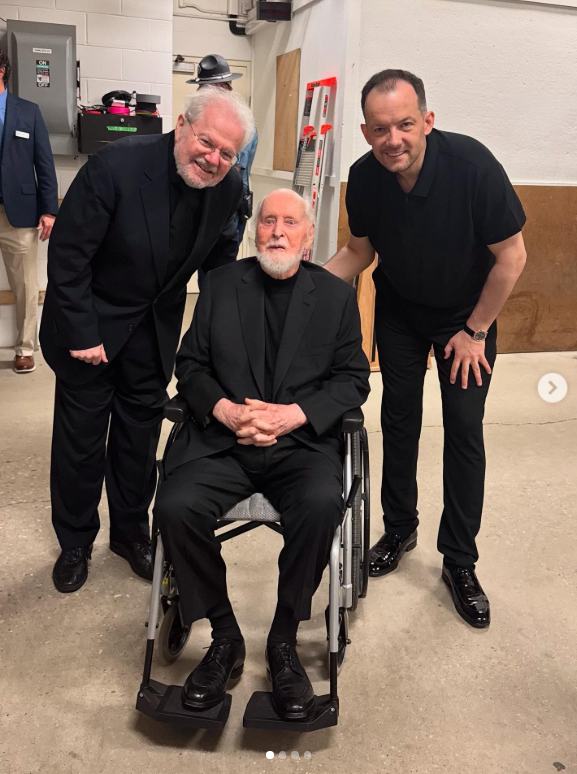
Source: Instagram
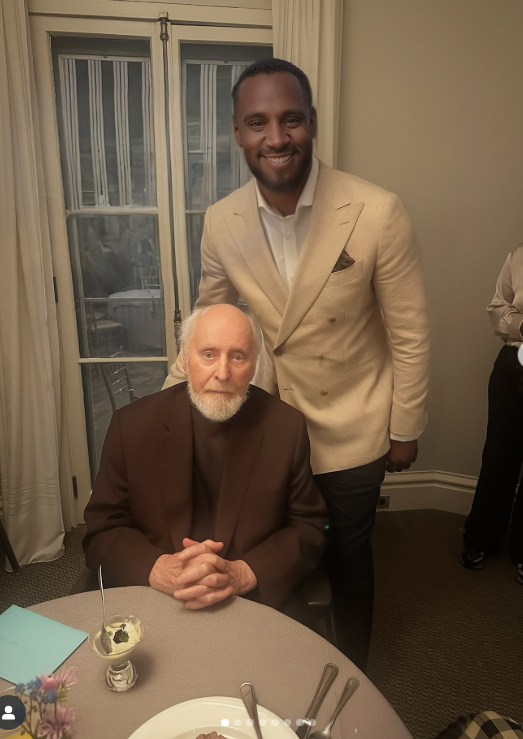
Source: Instagram
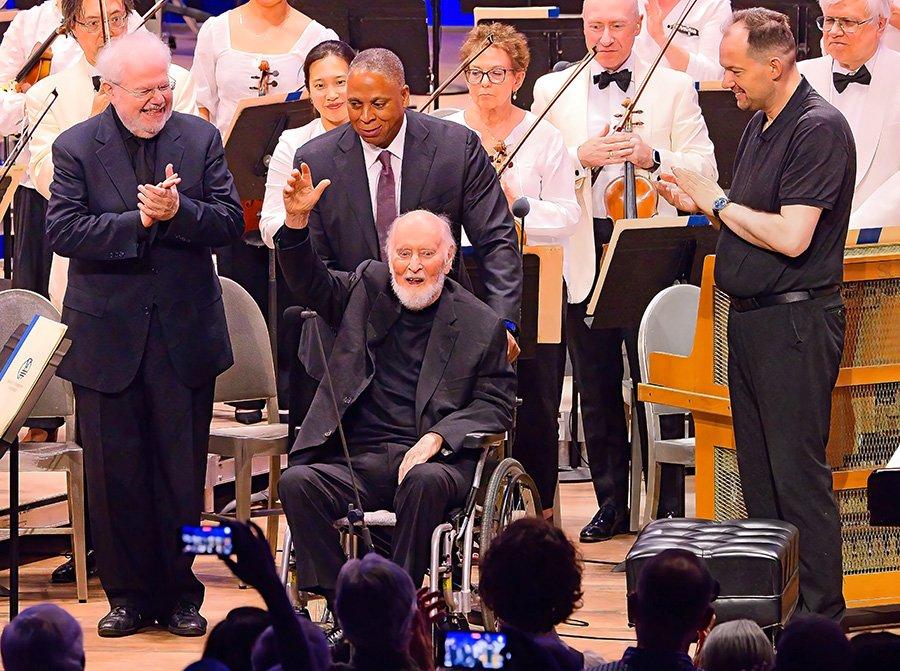
Source: The Boston Musical Intelligencer
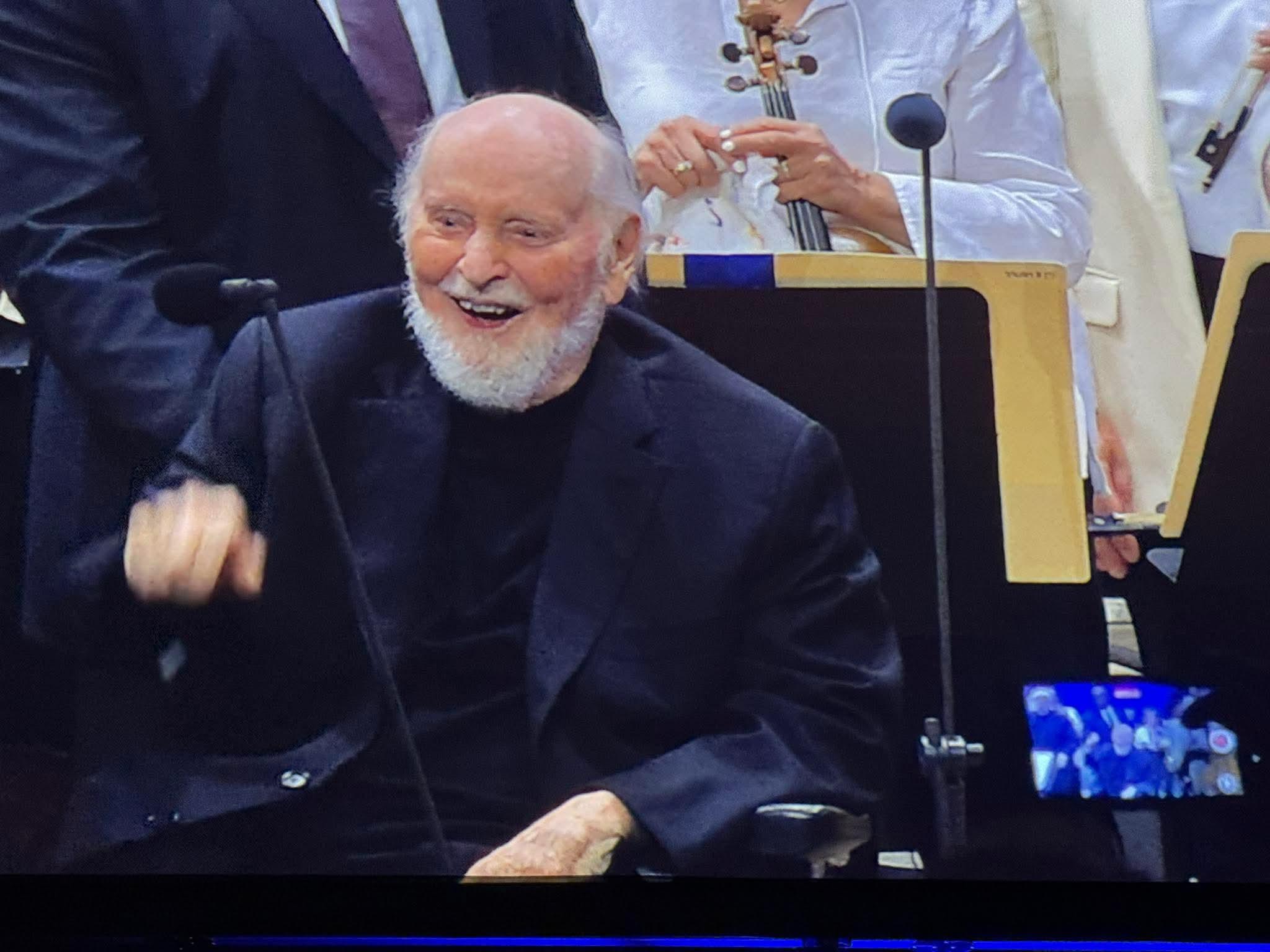
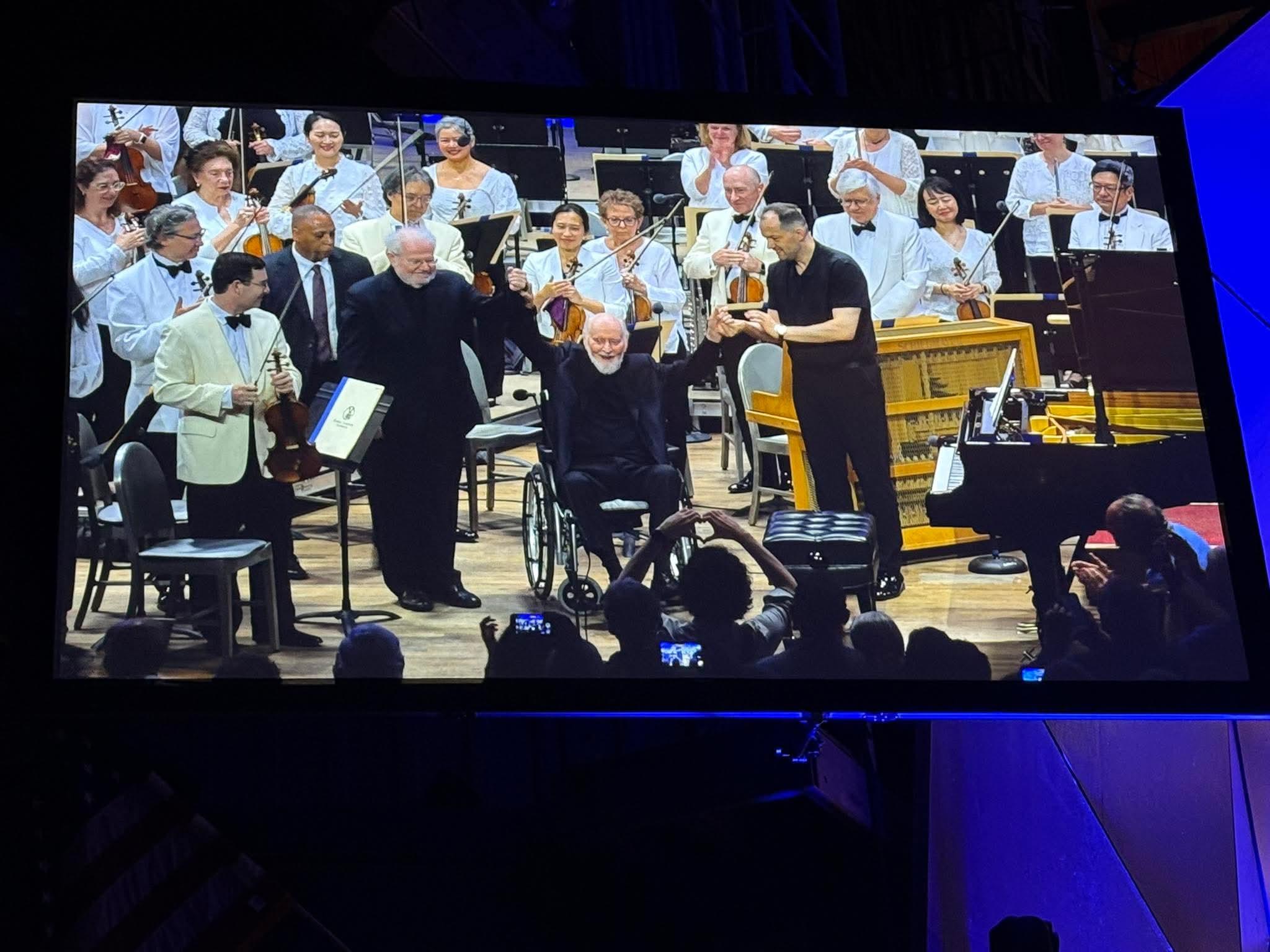
Source: X.com
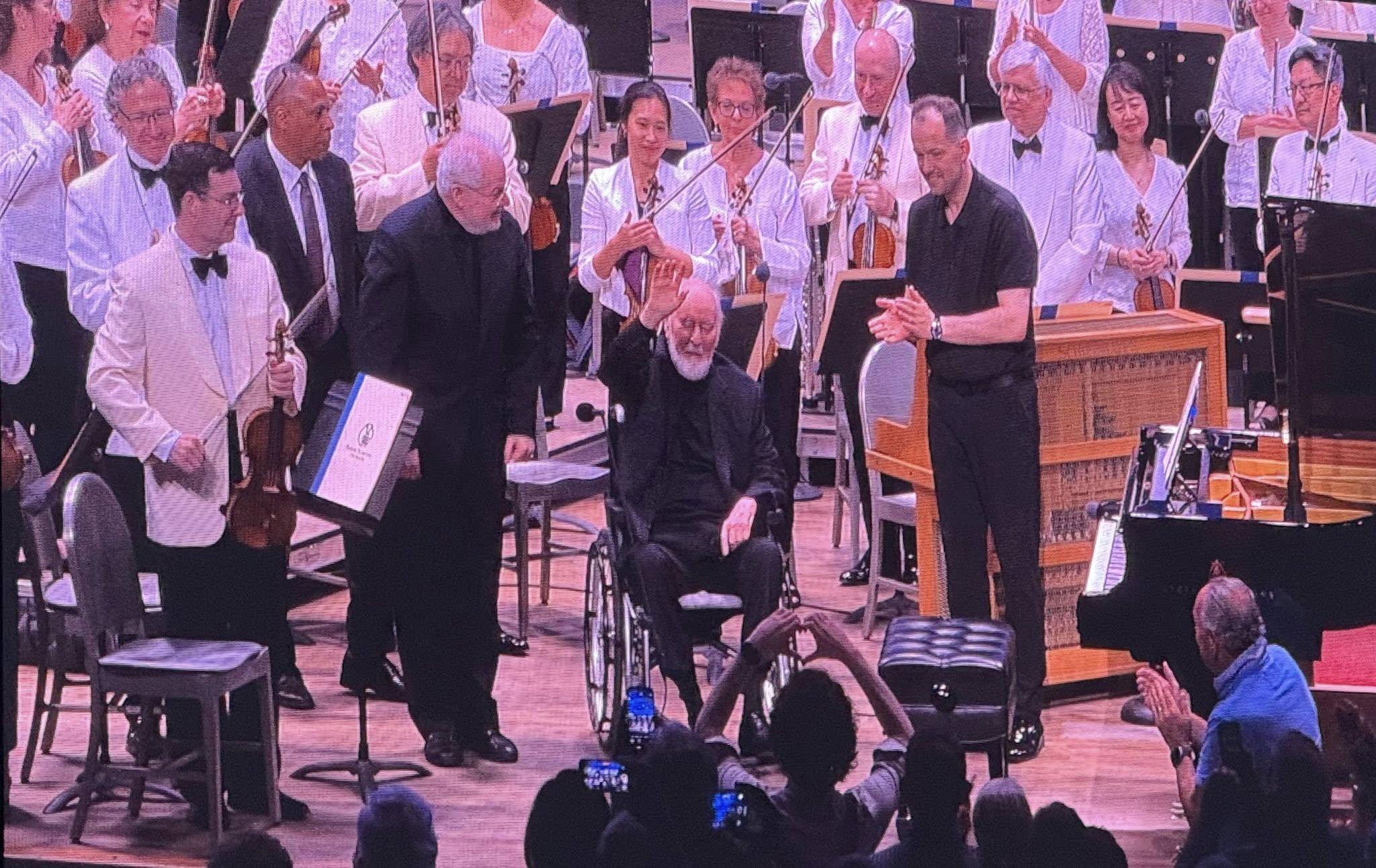
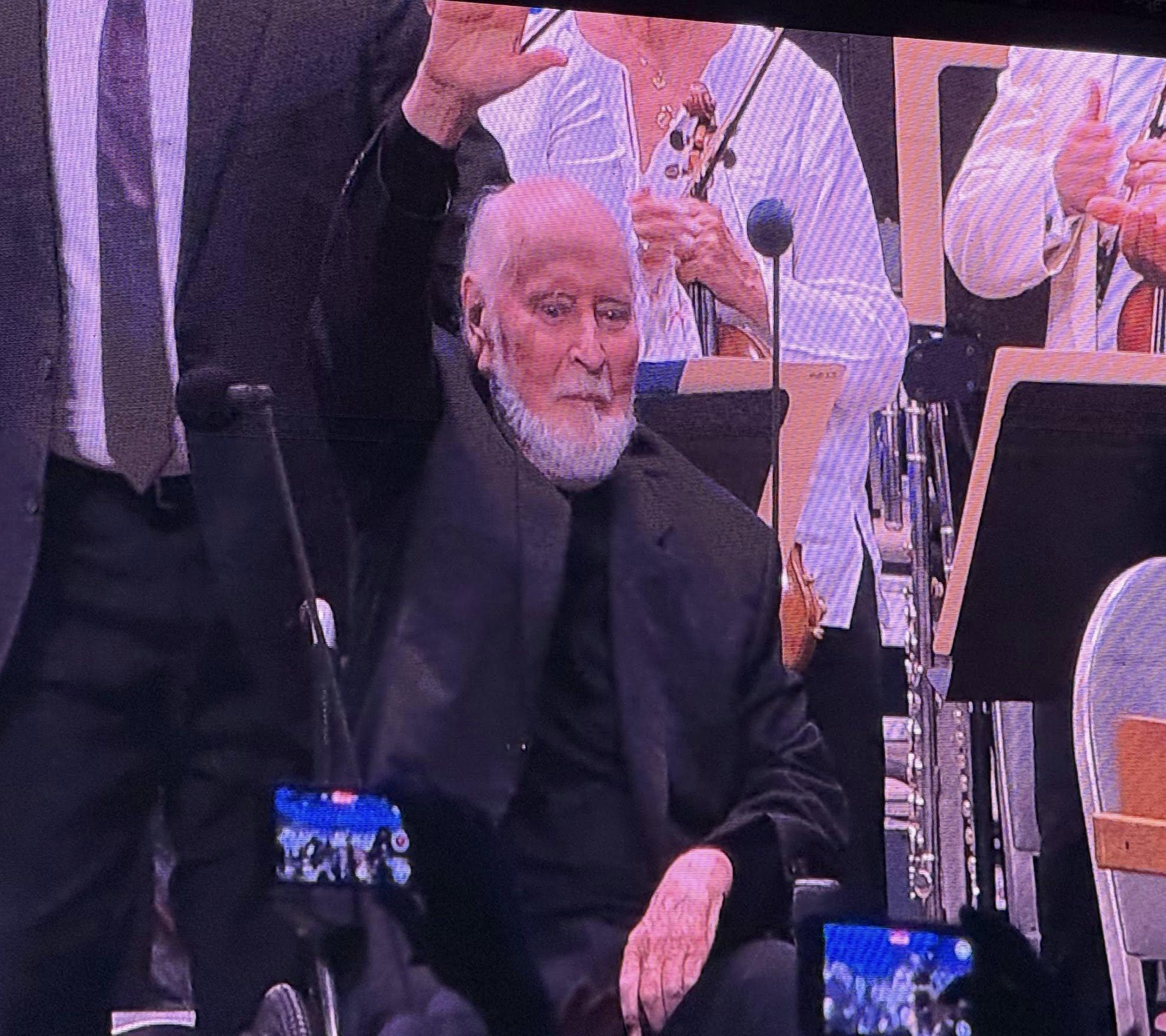
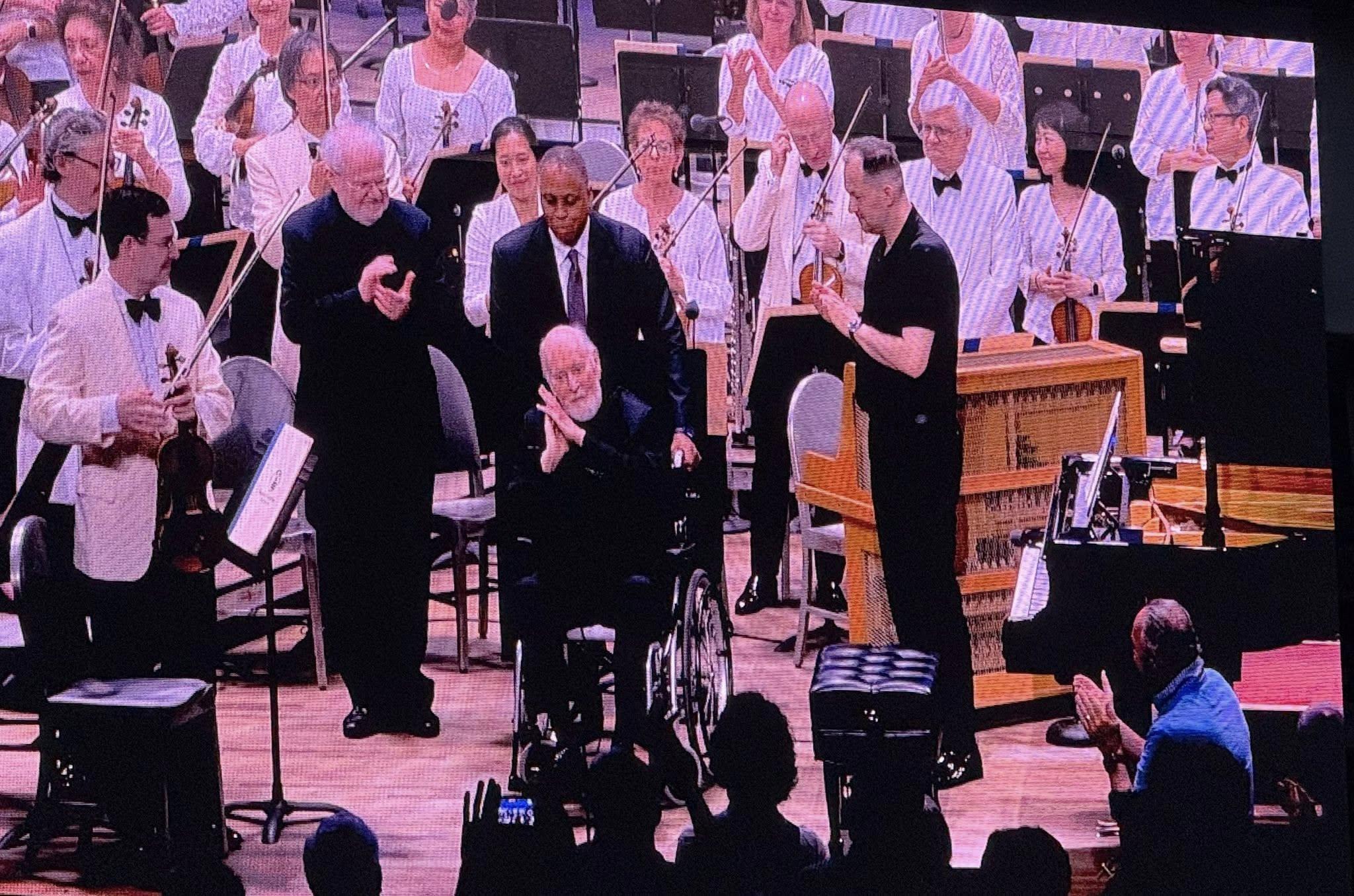
Source: Facebook
VIDEO
Source: Instagram
REHEARSAL PHOTOS
